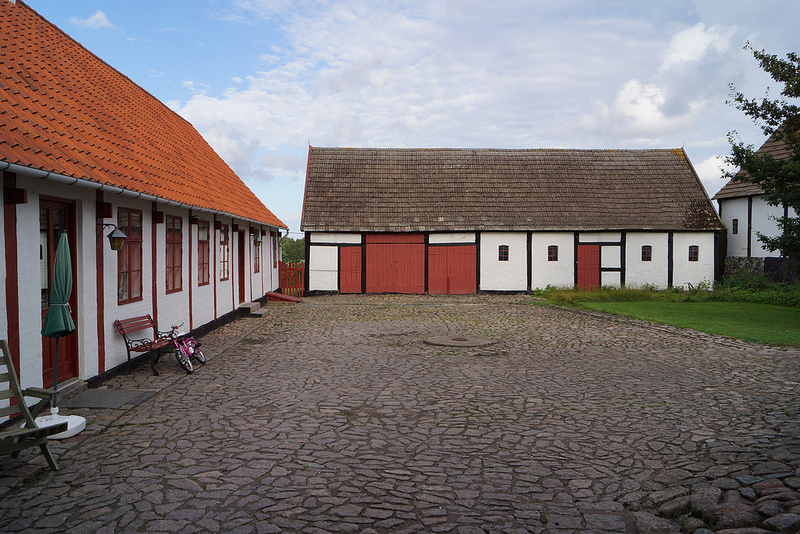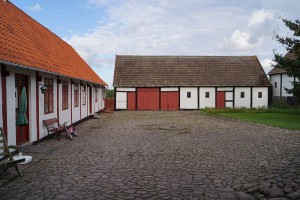 We arrived when summer was in full bloom, stepping into the garden of the old farmhouse mid-afternoon, to find it abundant and ripe with life.
We arrived when summer was in full bloom, stepping into the garden of the old farmhouse mid-afternoon, to find it abundant and ripe with life.
Two enormous cherry trees greeted us as they swayed in the breeze, the weight of the fruit on the branches, causing them to bow and bend and sometimes snap.
A gnarled old apple tree bore deep-red apples, clustered in threes, proudly proclaiming that its productive years were not yet over.
Bees thrummed among the blossom of the hedgerows, the blackberries already reddening and growing plump. The autumn harvest would be a bumper crop, sweet with the promise of jam.
Beyond the hedgerows, the fields swayed and glistened, the wheat high and perfectly golden.
Above us, in the trees, sparrows, wrens and finches chattered and fluttered, their din a constant background noise that filled the garden from dawn to dusk.
Overhead, swallows swooped and wheeled in the summer skies, their swift acrobatics a source of amazement and wonder.
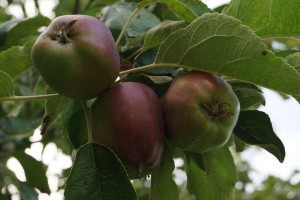 We stepped into this garden and allowed all this life to wheel around us, standing in its centre as we emptied ourselves of the city, understanding how vital it is to have such moments.
We stepped into this garden and allowed all this life to wheel around us, standing in its centre as we emptied ourselves of the city, understanding how vital it is to have such moments.
When the chirp of birds and the hum of bees, replaces the drone of city traffic and the rowdy heckles of human chatter.
I watch Helena, as she dangles lazily on a swing hung from the apple tree, her mouth stained purple from gorging on succulent cherries.
Back home, hemmed in as we are by buildings and roads, and often thwarted by wind and rain, we have to manufacture our distractions and entertainments.
Here a rickety swing, hung from an old tree, will provide endless hours of pleasure.
And the ease of it all is enough to make me release a sigh that becomes a laugh.
Helena looks at me, a little perplexed.
“What are you laughing at?”
“Oh, nothing.”
She doesn’t believe me and stops swinging, the question firing back at me, more insistent this time.
“What is it? What are you laughing at?”
The clownish face of a six year old cherry stained girl. I could tell her this. How it makes me smile and laugh and feel good inside. But you cannot laugh at six year old girls. The tears come free and fast if you do.
“I just never imagined perfect places such as this, actually existed” the little lie I allow myself.
Although it’s true. I had not imagined such places to exist beyond the realm of dreams or cliché.
And yet, here we are. And we have a week to drink our fill of it.
*
I was hanging washing on the line when I saw it.
A tiny bird lying low in the grass, not daring to move for fear of revealing itself. It kept a wary eye upon me, and I thought for a moment to leave it there like that. Not to startle it, or cause its heart to thump in its breast.
But curiosity got the better of me, and I approached it. Whispering for some reason, believing the soft lisp of my words will pacify it and make it feel secure.
It flutters over the grass, it swings spread, struggling to make progress. But it does not lift. Its wings, for some reason, unable to carry it upwards.
I scoop it up in my hands and feel the accelerated flutter of its heart. Examining the wings I can see no signs of damage. I splay each one out, gently, and see only perfection.
The tail feathers however, seem bent slightly, a slight inward twist, that may be the cause of the immobility.
It squeals a complaint, the yellow stripe outlining the beak, garish and startling, as though emphasising the complaint.
And I’m not sure what to do. Out here, in the hot sun, on the open expanse of grass it is vulnerable to the elements or the crows that fill the skies above the wheat fields. Earlier in the day I had spotted a kite hovering. Any one of them could take this helpless thing. Devour it. Think nothing of it.
I tut at myself for my sentimentality in the face of nature.
But I don’t have the heart to leave it to fate there on the grass.
I spot a leafy overgrowth at the base of a tree stump and decide to place it there. Hidden from view, in the shade. Perhaps it will stand a chance there.
It looks like a fledgling, its wings strong, just days from flying the nest. Accidently fallen before it had truly accomplished flight.
I hide it away and head back inside.
*
The next morning Helena follows me outside. She knows I’m up to something and when she spots that stricken bird in my hands she is fascinated and demands to hold it.
It is still strong, its wings flapping, its mouth emitting a screech of defiance. But I wonder none the less. Did it feel a little weaker? Are the wings a little limp?
I explain to Helena that she can’t hold it. That it is too small, too delicate to hold and she may accidentally harm it if she squeezes too tight.
She understands, but is disappointed nonetheless, so we agree that she can stroke it and offer comfort.
“What shall we do with it?” she asks.
“Put it back in its hiding place” I explain and then tell her about the sun and the crows and the kite that is hunting close by.
She tilts her head skywards as if seeing it anew. Like a small, nervous mouse, alert now to this new danger from above.
Later that day I will listen to her as she peers through the foliage and gently chats to the bird.
“It’s me, Helena. Don’t be scared. It’s just me, Helena.”
Kids and animals. There’s an understanding there most of us lose eventually. I watch her as she whispers into the leaves, her kindness and concern pleasing me.
I hope the bird makes it. If only for her sake.
But the next day I find it again. It has somehow covered the ground from its hiding place to the cherry tree, a distance of fifty meters or so. But the exertion has clearly left it exhausted, and this time, when I pick it up, it offers no resistance, offers no complaint. Just looks at me, unmoving, unable to fight the inevitable.
I fill the cap of a water bottle with water and set it under its beak, forcing some drops down it. Hoping the water will be enough.
“Damn it, another day in the nest and you’d have flown, little bird. Come on!”
It lies still in my hand, and I can feel the life draining from it.
I set it in the grass and go to fetch Helena, telling her the bird won’t survive that it is dying.
“Perhaps you want to say goodbye?”
We head to the cherry tree and I see it immediately. That those few moments have been all it took for the bird to move from life to death.
I tell Helena she can pick it up now, hold it in her hands.
“Is it dead?”
She whispers it. Scared even to say the word. This is the first time she has encountered death, and although it is just a small bird, the impact of it is no less for it.
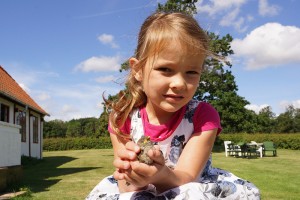 I nod and watch as she takes the bird and begins to examine it.
I nod and watch as she takes the bird and begins to examine it.
“It looks the same” she finally mutters.
“Yes, it does. Perfect isn’t it?”
“It didn’t get very long.”
“No, I guess it didn’t. Just a baby really. Poor thing. A few more days in the nest and I think it would have been okay. It must have fallen out.”
She wants to bury it, to have some ceremony but I explain it’s not our garden and that anyway, a bird in the wild prefers to be free, not to be buried deep in a hole.
She seems to understand it.
“What shall we do with it then?”
And I know what I want to do with it. I want to throw it over the hedge and into the wheat field. To let it lie there and nourish the ground, the way these things are meant to be.
I hesitate unused if I should admit to this. It seems callous. And yet, it’s the way it is and when are you supposed to learn about such things? Is six to young.
So I tell her. Throw it over the hedge. I explain how it’s little body will nourish the soil, will help the wheat to grow next year.
“Or the flowers. Maybe a flower will grow there? One of those blue ones.”
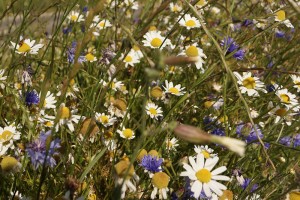 We have been admiring the poppies and daisies and cornflowers that line the edges of the fields. The perfect way the colours complement one another.
We have been admiring the poppies and daisies and cornflowers that line the edges of the fields. The perfect way the colours complement one another.
I smile.
“Yes, I think so. It looks like a little cornflower to me, don’t you think?”
And her nod is vigorous as, with a heave, she launches the bird on its maiden flight over the hedge and deep into the wheat.
